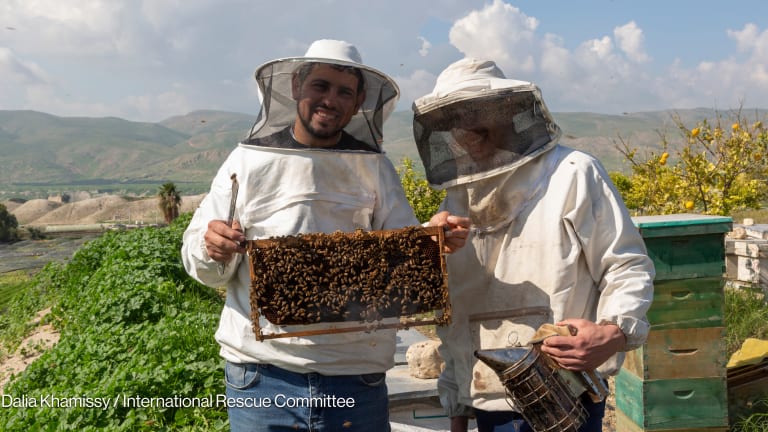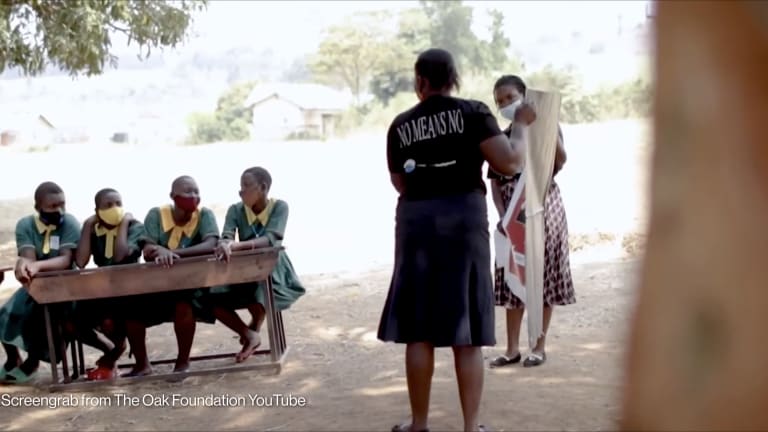3 major grant-making foundations in financial services
The Citi Foundation, Mastercard Foundation, and UBS Optimus Foundation contributed over $400 million in development grants, prior to the pandemic. Devex looks into their main initiatives and opportunities for partnership.
Private philanthropic foundations are steadily increasing their contributions to development finance, reaching an annual average of $8.2 billion in 2018-2019, according to data from the Organisation for Economic Co-operation and Development. Like other major private corporations, financial services companies engage in development financing; most commonly by grant-making via corporate social responsibility programs or setting up a foundation. In 2019, three major global grant-making financial services foundations — the Citi Foundation, Mastercard Foundation, and UBS Optimus Foundation — contributed over $400 million in development grants. Though these foundations vary in terms of their relationship to their parent company — Mastercard Foundation works independently and the Citi Foundation works hand in hand with its corporate arm — they all work toward similar development goals, targeting education, financial inclusion, and economic development, among others. This article looks into these foundation’s main initiatives and opportunities for partnership. Citi Foundation Headquarters: New York, U.S. Founding year: 1998 Financials (2019): $26.4 million was disbursed toward development, according to OECD Geographical focus: Over 80 countries across several regions Program areas: Youth employment and skills training, financial inclusion, and local community-oriented solutions As the private foundation of Citibank, Citi Foundation provides philanthropic grants and works to over 250 organizations in more than 80 countries to increase financial inclusion, catalyze job opportunities for youth, and support community economic development. Its flagship initiative Pathway to Progress aims to increase employment among low-income youth around the world. The initiative received $100 million in September 2020 for a three-year expansion. Citigroup provides manpower support by leveraging its employee volunteers to serve as mentors. Since its launch in 2014, the initiative has already reached 850,000 youth through the $223 million the foundation has invested so far. Although its foundation arm is a separate entity, Citigroup works closely with the Citi Foundation to maximize its impact. In 2019, together they provided $147 million in grants and charitable contributions, and last year the net profit earned by Citi from loans under the Small Business Administration's Paycheck Protection Program to small businesses was donated to the foundation. How to partner: The Citi Foundation partners with nonprofit organizations, schools, universities, and government entities through grant awards or earmarked contributions to multilateral institutions. In 2018, 75% of grant-making was directed to NGOs, out of which 77% went to international entities. The foundation evaluates proposals based on impact, the organization’s track record, and the prioritization of diversity, equity, and inclusion. Find the grant guidelines for 2021. Mastercard Foundation Headquarters: Toronto, Canada, with offices in Ghana, Nigeria, Rwanda, and Kenya Founding year: 2006 Financials (2019): $299 million was disbursed for development outcomes, according to OECD Geographical focus: Canada and over 25 countries across Africa Program areas: employment, education, innovation in education, and financial inclusion Working independently from Mastercard Company, the Mastercard Foundation has its own leadership team and board. It is one of Mastercard’s biggest shareholders, with a shareholding of 11%. Since its establishment, the foundation has made commitments of approximately $4.4 billion. The programs focus on education and financial inclusion. Its most well-known flagship initiative is the Young Africa Works Strategy, launched in 2018, which aims for 30 million young people, especially women, to get employed by 2030. The program works on improving the quality of education and training, using technology to connect the labor force to the employers, and helping the expansion of small businesses. In 2021, the foundation partnered with EF Education First in Rwanda, and with MEST, a technology training hub in Ghana. In response to the pandemic, the foundation launched its COVID-19 Recovery and Resilience Program — of up to $40 million — to help African countries and Indigenous communities in Canada. How to partner: Since 2018, the foundation shifted from grant opportunities to partnerships. Currently, it does not accept unsolicited proposals. The foundation values local knowledge and expertise within the countries it operates, with country offices across Africa. These offices may act as a good entry point for those interested in partnering. UBS Optimus Foundation Headquarters: Zürich, Switzerland, with offices in Singapore, Germany, and the U.K. Founding year: 1999 Financials (2019): $109.5 million in approved grants, according to its annual report Geographical focus: 20 countries across several regions Program areas: child protection, health, education, and environment UBS Optimus Foundation is a grant-making organization established as an independent entity by UBS Group. Since its inception, the foundation has approved grants of $525 million programs to support underprivileged children across the globe in areas of education, health, child protection, and the environment. The foundation is also active in results-based finance mechanisms, including development impact bonds. It was the upfront investor in the first DIB in education in India and is involved in channeling investments with early-stage innovation-focused funders. In 2020, the foundation launched a $1.5 million COVID-19 Relief Grant Prize which was awarded to Healthy Learners and Young 1ove to support their innovative approaches towards child education and health amid COVID-19 in Zambia and Botswana. A COVID-19 response fund was established to raise donations, which UBS Optimus Foundation matched with 10% of its own sources. How to partner: As a grant-making foundation, any institutions or organizations are eligible to apply as long as they are involved in health, education, protection of children, or climate and environmental issues. Applications from consortiums of organizations from different disciplines and from NGOs and research institutes are encouraged. Proposals are reviewed under an evidence-based approach focused on the scalability, innovation, and sustainability of projects. Raquel Alcega contributed to this piece. Try out Devex Pro Funding today with a free 5-day trial, and explore funding opportunities from over 850+ sources in addition to our analysis and news content.
Private philanthropic foundations are steadily increasing their contributions to development finance, reaching an annual average of $8.2 billion in 2018-2019, according to data from the Organisation for Economic Co-operation and Development.
Like other major private corporations, financial services companies engage in development financing; most commonly by grant-making via corporate social responsibility programs or setting up a foundation.
In 2019, three major global grant-making financial services foundations — the Citi Foundation, Mastercard Foundation, and UBS Optimus Foundation — contributed over $400 million in development grants.
This story is forDevex Promembers
Unlock this story now with a 15-day free trial of Devex Pro.
With a Devex Pro subscription you'll get access to deeper analysis and exclusive insights from our reporters and analysts.
Start my free trialRequest a group subscription Printing articles to share with others is a breach of our terms and conditions and copyright policy. Please use the sharing options on the left side of the article. Devex Pro members may share up to 10 articles per month using the Pro share tool ( ).
Janadale Leene Coralde works as a contributing analyst for Devex. Based in Manila she reports on development donors activities and designs funding data visualisations. She has a degree in political economy, specializing in international relations and development, and has previously worked as a researcher for Chemonics, the REID foundation, and the Philippines House of Representatives.
Miguel Tamonan is a Senior Development Analyst at Devex, where he analyzes data from public and private donors to produce content and special reports for Pro and Pro Funding readers. He has a bachelor’s degree in Political Science with a Major in International Relations from the Polytechnic University of the Philippines.









